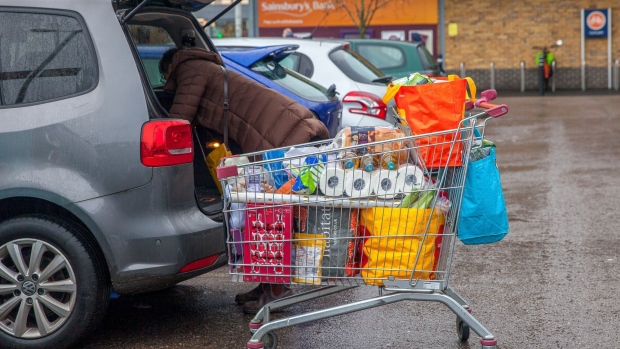Nov 29, 2023
Supermarkets’ Loyalty Cards Come Under Scrutiny: The London Rush
, Bloomberg News

(Bloomberg) -- Hi, I’m Leo from Bloomberg’s UK Breaking News team, catching you up on this morning’s business stories.
If you forget your supermarket’s loyalty card — and don’t have it on your phone — you might as well go and buy your groceries at Harrods. That’s the perception of many consumers and likely fed into the Competition and Markets Authority’s announcement this morning.
The watchdog said it’ll investigate the “two-tier pricing system” developing in supermarkets as a result of loyalty schemes which it said can confuse shoppers. The likes of Tesco and Sainsbury’s, who were cleared by the CMA of profiteering over the summer, will keep a close eye on the investigation. Especially since loyalty cards have become a key tool in their battle against discounters Aldi and Lidl.
What’s your take? Ping me on X, LinkedIn or drop me an email at lkehnscherpe@bloomberg.net.
Key Business News
Food delivery firm Deliveroo is extending its order options to DIY, homeware and beauty, it said ahead of an investor event today. The move, just in time for Christmas, comes after the Supreme Court last week ruled that the company’s delivery drivers are not classed as workers and can’t form a trade union.
Heathrow shareholder Ferrovial agreed to sell its 25% stake in the airport to French and Saudi entities, pulling in £2.37 billion. Ardian, a Paris-based private equity firm, will buy a 15% stake in FGP Topco, owner of the busy London hub, while Saudi Arabia’s Public Investment Fund will buy 10%. Air traffic has rebounded after being decimated during the Covid-19 pandemic, helping Heathrow to narrow its losses over the first nine months of this year. Still, it remains burdened with more than £14 billion of debt.
Blackstone, meanwhile, has quietly built the largest flexible office brand in London’s central districts. The private equity firm’s platform, which it originally bought as The Office Group but has today rebranded following a merger with Brockton Capital’s Fora last year, now boasts more locations in London’s zones one and two travel districts than any other flexible office brand. WeWork, which has filed for bankruptcy in the US, became the biggest private sector occupier of London office space in 2017 but has since retreated in an attempt to cut its worst loss-making locations.
Markets Today’s Take
The pound is continuing to appreciate against the US dollar and is set for another month of a gain close to 5%, fuelled by cooling bets on when the Bank of England will start cutting rates and, likely more importantly, ongoing weakness in the dollar.
The question is whether the pound’s strength can last. The UK’s stagnant economic outlook, concerns about how consumers will fare next year and how quickly the jobs market will soften may put pressure on the BOE to ease policy, which could then weigh on the pound. Meanwhile, the US is contending with a mixed economic picture, a growing budget deficit and the many and various risks that an election brings, which could combine to keep a lid on the dollar. All creating a fine balance to watch closely when we enter the new year.
— Sam Unsted
For more news and analysis throughout the day, follow Bloomberg UK’s Markets Today blog.
What’s Next?
Dr. Martens reports first-half results tomorrow. Investors will be keen to know whether the bootmaker can regain some of its recently lost popularity — and how its new store on Oxford Street is faring.
The London-based firm didn’t have an easy year. The retailer lowered its forecasts over warehouse disruption in the US and shares have lost over 40% of their value since January.
That said, its latest hires — experienced finance chief Giles Wilson and former Apple director Ije Nwokorie as brand head — could boost Dr. Martens’ “visibility and market penetration in the medium term,” as Bloomberg Intelligence points out.
©2023 Bloomberg L.P.

